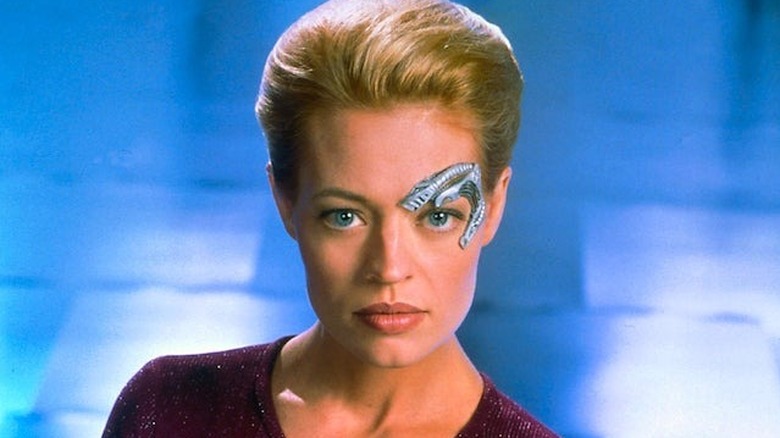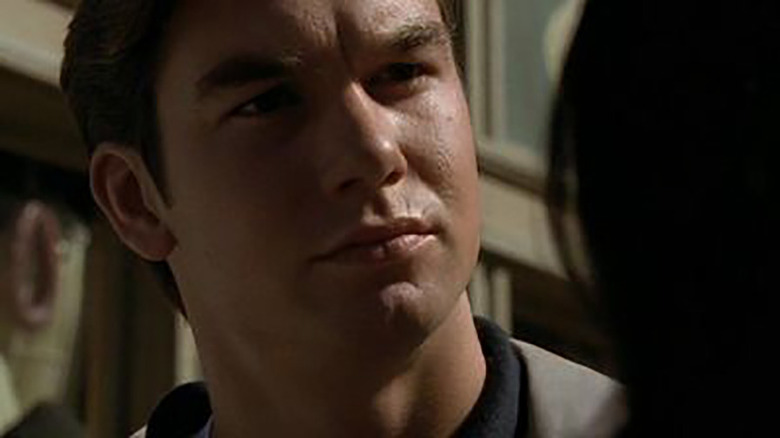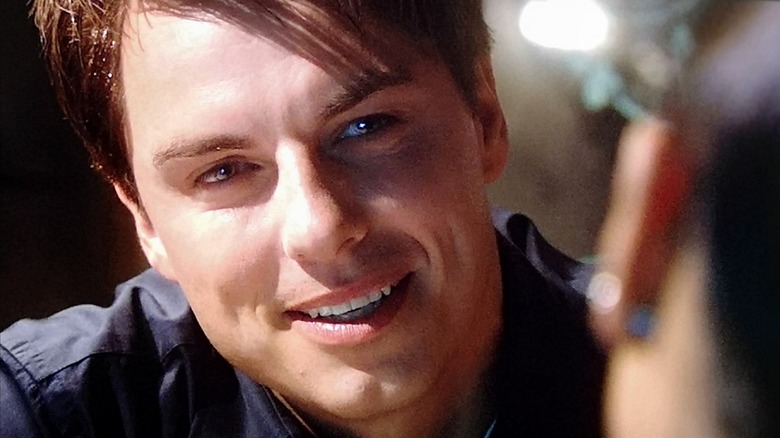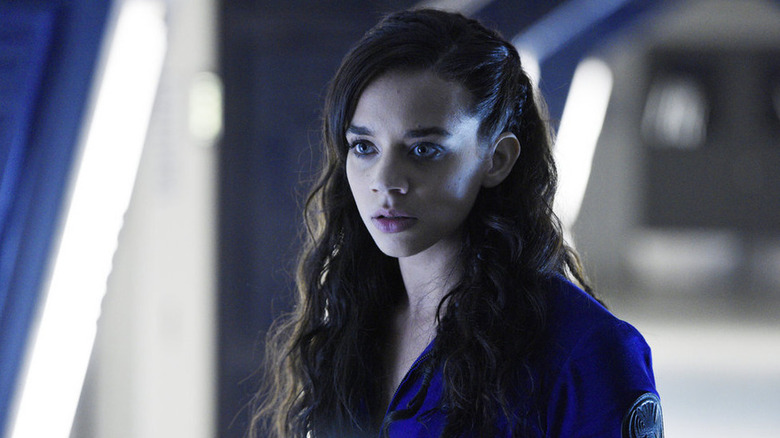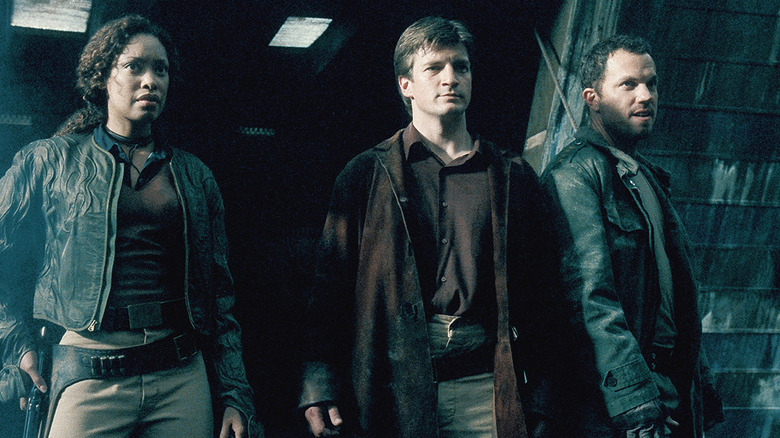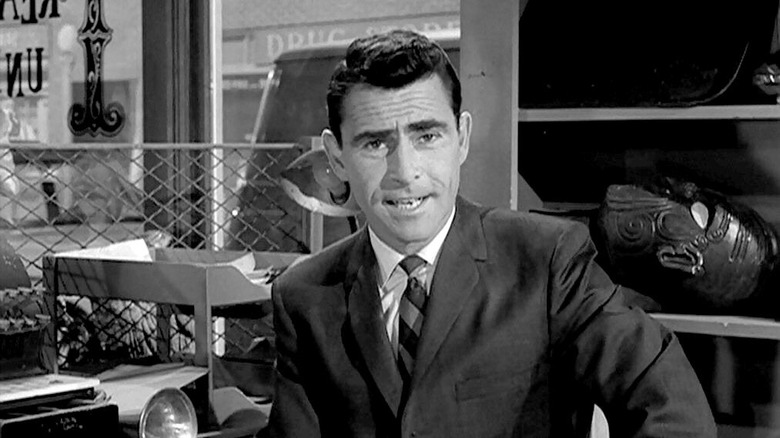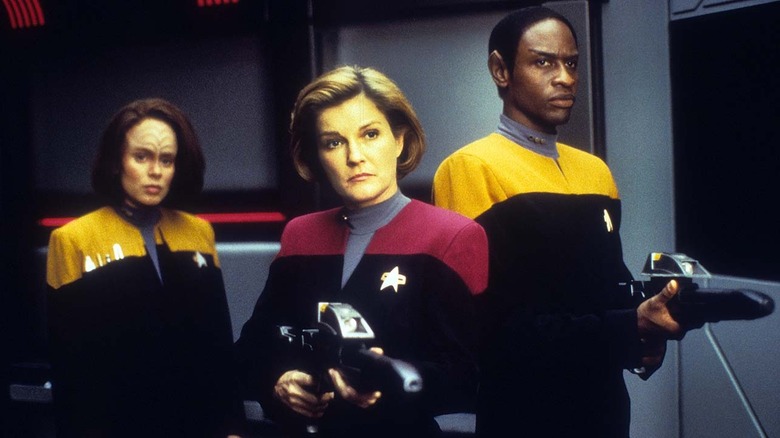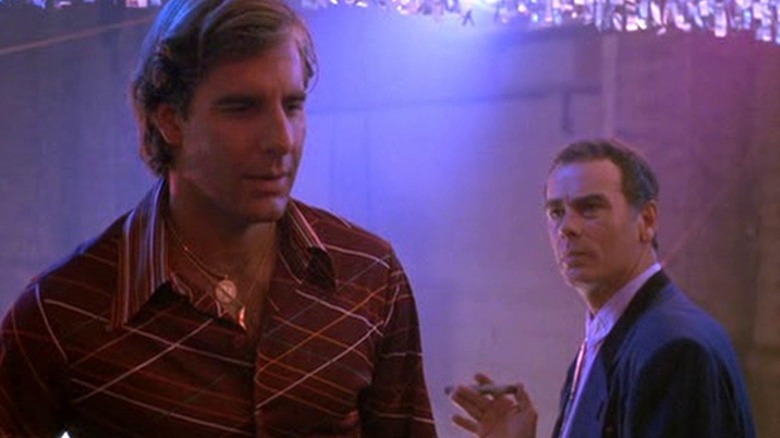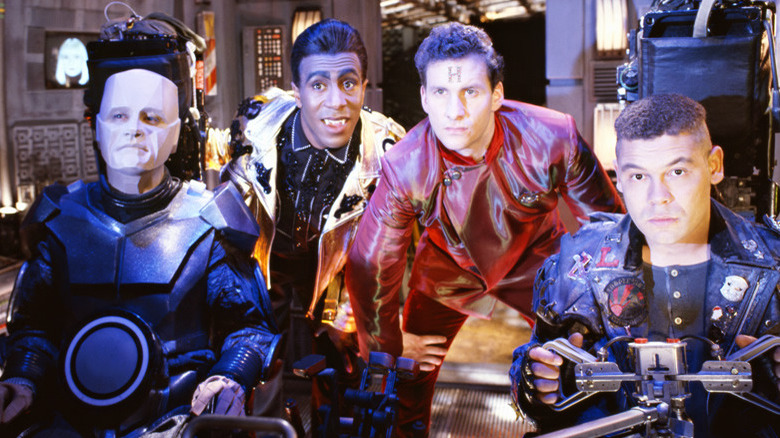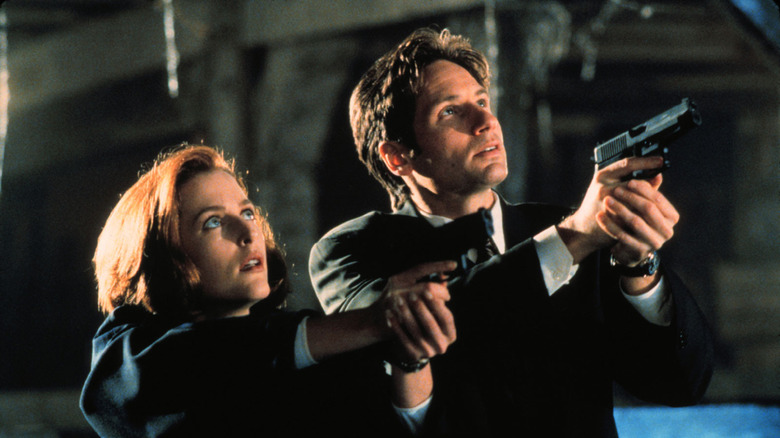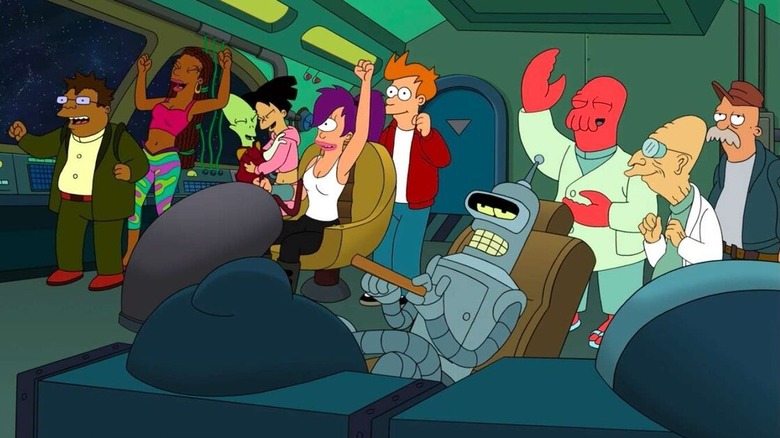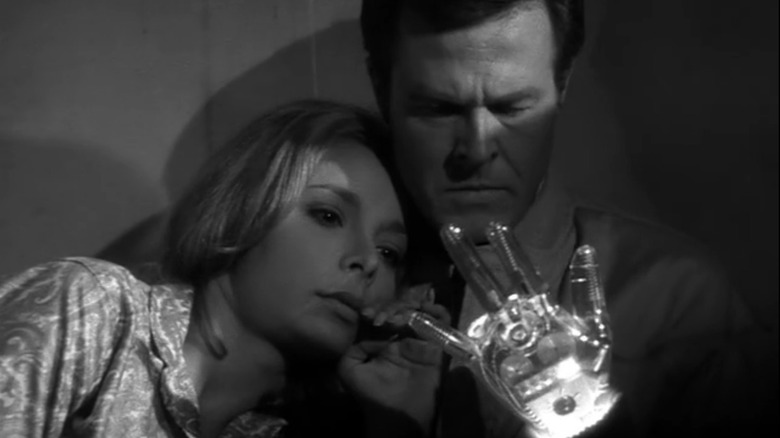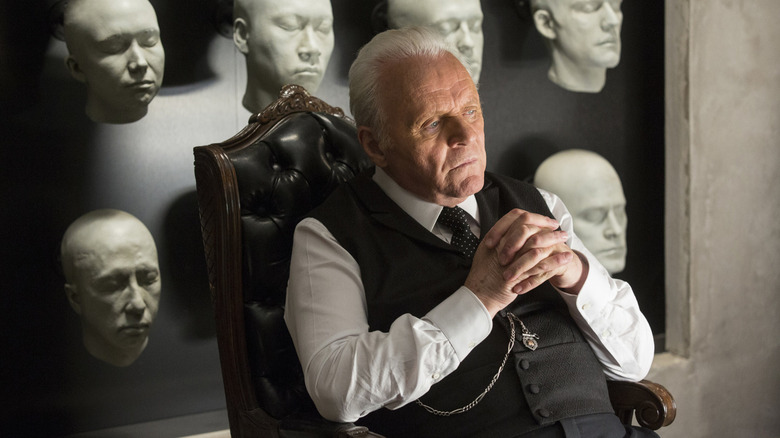The Most Rewatchable Sci-Fi Shows Of All Time
Some of the earliest science fiction television shows aimed at adults popped up in the 1950s, with mind-bending, thought-provoking anthology programs like "Tales of Tomorrow" and "The Twilight Zone." These shows gave audiences a window into the unknown, whether that was outer space or bizarre alternate dimensions. Over the years any number of sci-fi hits (and misses) have passed over the airwaves and fascinated audiences with stories of the weird and the wondrous.
But which shows are the best to watch over and over again? Shows that can be binged repeatedly and still remain as timely and entertaining as they were the first time you turned them on? From "Star Trek" to "The X-Files," there are shows that are easily accessible, require little to no background, and can be picked up and enjoyed at almost any point.
With few exceptions, the most rewatchable sci-fi shows tend to be of the episodic variety. Shows like "Babylon 5" or "Star Trek: Discovery" are incredible feats of sci-fi storytelling, but feature complex, ongoing storylines filled with interwoven plotlines that make individual episodes a challenge to enjoy on their own. Meanwhile, shows like "Battlestar Galactica," while high quality dramas, rely heavily on ongoing mysteries, big plot twists, and shocking revelations that can dampen the excitement on a rewatch when you know what's coming.
With all that in mind, here's our list of the most rewatchable sci-fi TV shows of all time.
Sliders
The mid-90s were a good time for sci-fi television, seeing the release of some big hits that would become cultural landmarks and pop icons. There were even more great shows that came and went with little fanfare, as well as others that landed somewhere in between. Firmly in the latter category was "Sliders," an early exploration of the multiverse concept that aired on Fox (and for its final two seasons, the Sci-Fi Channel), but never seemed to get the recognition it deserved. Chronicling the adventures of four friends who get lost in a alternate reality, the group would enter a new parallel dimension each week and discover different versions of Earth unlike our own; it was "Quantum Leap" across the multiverse, and it entertained audiences with bizarre, fantastical stories for five seasons.
Though its final years included an ongoing subplot about an alien invasion, "Sliders" was largely an "adventure of the week" series, with Quinn, Wade, Arturo, and Rembrandt challenged by the unusual alternate worlds they found themselves on each episode. From a Wild West world where Texas had become its own Republic, to an Earth run by women, it successfully mixed elements from different genres to create a unique adventure series that was well ahead of its time, and is perhaps the one show on this list that most deserves a reboot.
Torchwood
A surprising spinoff of the British classic "Doctor Who," the 2006 launch of "Torchwood" saw fan-favorite companion and fellow time-traveling adventurer Jack Harkness get the spotlight in his own series. Debuting just a year after the successful revival of its parent series, "Torchwood" was a much more adult-skewing show than the somewhat family-friendly "Doctor Who." Tackling more serious and darker subject matter, it even featured a serial child abuser in its main cast, played by American star Bill Pullman. Other main cast members included Indira Varma ("Game of Thrones") and Mekhi Pfeiffer ("ER").
In the series, the wisecracking warrior Jack Harkness allies himself with a shadowy agency called Torchwood, which has existed as far back as the 1870s solely to repel alien invasions and other extraterrestrial and supernatural threats. Though a darker show, star John Barrowman brings a welcome levity and lightheartedness that manages to mix well with the series' adult themes. "Torchwood" did include a handful of episodes that crossed over with "Doctor Who," but was otherwise largely a sci-fi procedural, with serious, thought-provoking themes amidst the alien adventures. Though the first season stumbled a bit, it found its footing by year two and quickly became a cult hit. Just about any Whovian will tell you it's a show worth watching over and over.
If you or someone you know may be the victim of child abuse, please contact the Childhelp National Child Abuse Hotline at 1-800-4-A-Child (1-800-422-4453) or contact their live chat services.
Killjoys
Airing for five seasons from 2015 through 2020, "Killjoys" starred "Ant-Man and The Wasp" villain Hannah John-Kamen, who was joined by Aaron Ashmore and Luke Macfarlane as a trio of bounty hunters working under contract for an interstellar organization called Reclamation Apprehension Coalition. The team of mercenaries cruised back and forth around The Quad, a region of space ruled by space tyrants and criminals, acting as futuristic repo men chasing down warrants for escaped cons and cargo. Though their mission was to remain neutral in galactic feuds, they were constantly finding themselves drawn into any number of conflicts and clashes between opposing forces in The Quad.
A fast-paced outer space adventure series, "Killjoys" was a return to classic sci-fi action, and while it had its darker moments, it largely eschewed the more depressing dystopian tone of shows like "Battlestar Galactica" in favor of a "Star Wars"-style mix of fun, humor, and space rebel drama. It was also a show with something to say, as stories were injected with "Star Trek"-like commentaries that gave their take on modern politics and contemporary social issues. Under-appreciated while on the air, it's always received great reviews, and its episodic format makes it perfect for a rewatch.
Firefly
Before he was the director of Marvel's first mega team-up, "The Avengers," Joss Whedon was best known as the creator of TV shows like the popular "Buffy the Vampire Slayer" and the lesser known "Firefly," the latter best described as a Western in space. With a cargo hold packed full of action and adventure, "Firefly" dazzled with a cast of complex and compelling characters lead by Nathan Fillion ("Castle") as Mal Reynolds, captain of the starship Serenity and former soldier on the losing side of a decades-long galactic civil war. Fun, funny, and full of charismatic performances from its stars, "Firefly" is a show that — despite running just a single season — never gets old.
Although it's remembered today as one of the best science fiction series ever produced, ratings were abysmal when it first aired. Only nine of its 14 episodes were broadcast, and a feature film had to be produced to wrap up the story. With a passionate following, "Firefly" regularly shows up on "cancelled too soon" lists, and has seen multiple fan-driven campaigns to resurrect it from the dustbin of lost TV treasures. As recently as 2020, rumors of a reboot were making the rounds, but as of yet there's been no word on whether it will actually come to fruition.
The Twilight Zone
There's not much that can be said about "The Twilight Zone" that hasn't been said already. The groundbreaking anthology series that ran in its first incarnation from 1959 to 1964 was the brainchild of writer Rod Serling. While many will remember it for its many sci-fi tales and mind-blowing twist endings, it was also home to some great comedy and romance stories, with a library of classics that crisscrossed every genre. An enduring icon, it's one of the few shows from its era that has remained popular with every generation that followed it, and it's not hard to see why. Nearly every episode of the series has something different to offer, and all are well made. Despite being in black and white, and boasting performances and effects that are definitely of their time, there's still a certain timeless quality that has helped the series remain one of the most beloved television shows in history.
The rare series full of twists that never seem to soften over time, "The Twilight Zone" is as rewatchable as ever, with it still receiving regular marathons on broadcast TV to this day. Whether a comedic yarn about a man who can hear other people's thoughts or a haunting tale of a disfigured woman hoping for a new look, "The Twilight Zone" will satisfy no matter how many times you've seen it.
Star Trek: Voyager
The third spinoff from the iconic franchise, "Star Trek: Voyager" debuted in 1995 as the UPN network was just launching. The Federation's most advanced new starship, the U.S.S. Voyager, finds itself mysteriously catapulted 75,000 light years from home, and the series charts the crew's adventures as they make the long journey back to Earth. Alone in hostile territory, and forced to merge their crew with a group of Starfleet renegades, Captain Janeway and her ship of castaways faced dangerous new enemies each week and forged alliances with any friendly faces they encountered.
Though "Star Trek: The Next Generation" may be the most enduring of the 90s "Star Trek" spinoffs, that series' rough first two seasons make a rewatch problematic, while "Voyager" boasts perhaps the most consistently strong stories across its seven-season run. Nearly every episode of "Star Trek: Voyager" managed to deliver something dramatic, and to this day serves as a reminder of a time when sci-fi was full of excitement and family-friendly fun. Though it was a "Trek" series through and through, "Voyager" told its own brand of stories. While episodes were almost always self-contained, it excelled at growing the characters over time, including series standout Seven of Nine. If you're looking for a "Star Trek" series to binge on repeat from start to finish, this is the one.
Quantum Leap
Based around a unique sci-fi premise, "Quantum Leap" transcended the genre to become one of the most compelling drama series of the late 1980s. The show starred Scott Bakula as Dr. Sam Beckett, who invented a time machine that allowed him to inhabit the body of a person in the past. But when he tested it on himself, he was promptly lost in time. Thankfully, he had help in the form of Dean Stockwell as Sam's holographic companion Al, who only he could see and hear as Al guided him through his time travel adventures. Unfortunately, getting Sam home was not as simple as they hoped, with Sam being required to correct an injustice each week to leap to the next life — always hoping that his next leap will be the one that returns him to his own existence.
The unusual premise gave "Quantum Leap" a distinct opportunity to explore new stories with entirely fresh characters each episode, and while some segments may feel a bit dated, it remains a compelling science fiction series even today. Its easily accessible weekly adventure premise — that usually delivered a heartfelt drama or old-fashioned comedy — makes it one of the most rewatchable series on this list. The series ran for five seasons and nearly 100 episodes, providing some of TV's best, most touching stories in its day, while each week's "leap-out" teaser will leave you begging for more.
Red Dwarf
If you heard we were putting a decades-old British sci-fi series on this list you'd probably have guessed "Doctor Who," but it's the long-running "Red Dwarf" that gets our pick. Set aboard the titular starship, the series begins with the last human alive, Dave Lister, awakening from cryogenic sleep after three million years in hibernation. Save for a holographic man named Rimmer and a feline named Cat that's since evolved into a humanoid, the ship is deserted. Lister — a slovenly layabout who could be the forerunner of Philip J. Fry from "Futurama" — discovers the future is nothing like he ever imagined. Later joined by the robot Kryten in the second series, and other cosmic misfits as the series progressed, the ragtag bunch set out on episodic adventures across the galaxy.
From hilarious time traveling escapades to parallel dimension hopping, to an intergalactic game of pool played with planets, there's seemingly no limit to the zany adventures the crew of the Red Dwarf (and later the Starbug) would get mixed up in. Running for nearly 34 years off and on, there's over 70 episodes to choose from; none will fail to satisfy if you're looking for a good science fiction comedy, with its episodic long-running nature giving it more than enough rewatchability.
The X-Files
A landmark sci-fi drama, "The X-Files" rose from offbeat procedural to cultural touchstone, and made both David Duchovny and Gillian Anderson into bona fide superstars. A twist on the buddy cop format, Duchovny played veteran FBI agent Fox Mulder, a conspiracy-obsessed believer in all things alien and supernatural, while Anderson was agent Dana Scully, the fresh-faced, skeptical rookie partnered with him in the bowels of the agency. Together the mismatched pair were tasked with investigating so-called X-Files: cases that involving the possible paranormal or otherwise extra-ordinary. With alien abductions, mutant experiments, werewolves, and vampires, the series was a crowd-pleasing mixture of science fiction, horror, and crime drama. Although the series had its darker moments, it rarely took itself too seriously, which added to its considerable charm.
Running for an initial nine seasons between 1993 and 2002, it was revived for two more in 2016, and even had two theatrical films, with one released between its fifth and sixth seasons. The series had a few ongoing subplots but was mostly episodic in nature, with a new case and a new threat almost every week. A delight to rewatch for more than just the engaging stories, it's also fun to look back and see all the future stars who passed through its doors, including Bryan Cranston ("Breaking Bad"), Ryan Reynolds ("Deadpool"), Lucy Liu ("Elementary"), and Michael Emerson ("Lost").
Futurama
The second science fiction comedy on our list, Matt Groening's "Futurama" was likely first seen as an extension of "The Simpsons." But fans looking for a show that reminded them of the laugh-a-minute animated sitcom were probably disappointed. Instead, what audiences got was a much more clever sci-fi series that boasted sharper wit than its older cousin, packing fewer but more precisely targeted laughs. Episodes ran the gamut of science fiction, from post-apocalyptic adventures to mind-controlling slugs, and it managed to do it with hysterical social commentary as well.
The series centered on Philip J. Fry, a lazy Gen-Xer who is frozen in time in 1999 and awakened in the year 3000. There he finds a bizarre future world, and eventually takes a job as a space cargo delivery boy alongside one-eyed alien Leela, dim-witted lobster Zoidberg, jaded robot Bender, uptight number-cruncher Hermes, spoiled brat Amy, and doddering scientist Professor Farnsworth. With guest stars that included George Takei, Conan O'Brien, the Beastie Boys — and in one memorable episode nearly the entire cast of the original "Star Trek" — the series' laughs never get stale no matter how many times you watch it.
"Futurama" struggled in its initial run — where it concluded after 72 episodes across four years — but it has since been renewed twice.
The Outer Limits
While it's often been compared to the sci-fi classic "The Twilight Zone," which was still on the air when it debuted, "The Outer Limits" is quite a different series, sharing only the most basic of concepts as a science fiction anthology series. On its own merits it's been long considered one of the best in its genre, with many of its episodes and characters — as well as its opening narration, "Do not attempt to adjust the picture" — becoming every bit as iconic as Rod Serling's series. A darker show, and much more focused on aliens and monsters, "The Outer Limits" explored scarier stories than its contemporaries, and was never afraid to dig into the darker aspects of sci-fi and horror.
Some may lament its short two-season run, but that's also part of its appeal, as it didn't linger around long enough to grow tired or stale. Every episode packs a punch, and gives audiences a lot to ponder, time and time again. Rewatches will no doubt have the "the control voice" that opened and closed each episode indelibly etched into your consciousness, and its compelling stories — including a pair of classics by celebrated sci-fi author Harlan Ellison — will leave you as impressed as anything produced today. Using stories of bizarre creatures and terrifying mutants, the series examined many ethical and moral issues as well that still resonate just as loudly 60 years later, making it worth a watch (and rewatch) in any era.
Westworld
Produced by J.J. Abrams and written by Jonathan Nolan, "Westworld" was the unexpected reboot of the memorable — but hardly classic — film of the same name created by "Jurassic Park" author Michael Crichton. Set in a not-too-distant future where mankind has developed sophisticated A.I. and paired it with revolutionary synthetic humanoid bodies, "Westworld" is a haunting sci-fi epic. Using the android technology, a powerful mega-corporation called Delos has created Westworld, an immersive Wild West theme park where wealthy visitors can live out their deepest — and often times darkest — desires. Themes of destiny, free will, and determinism sit at the heart of "Westworld," and while it may be the rousing Western action and incredible human drama that will draw you in, it's the series' complex story that makes it so rewatchable.
Though the show is packed with plenty of twists and more than one shocking revelation, the fun in a rewatch comes from analyzing the carefully laid clues that lay in early episodes and point to the deeper mysteries in the series. Two or even three rewatches yield fun Easter eggs, references, and signs of future events that you probably didn't see the first time around.
